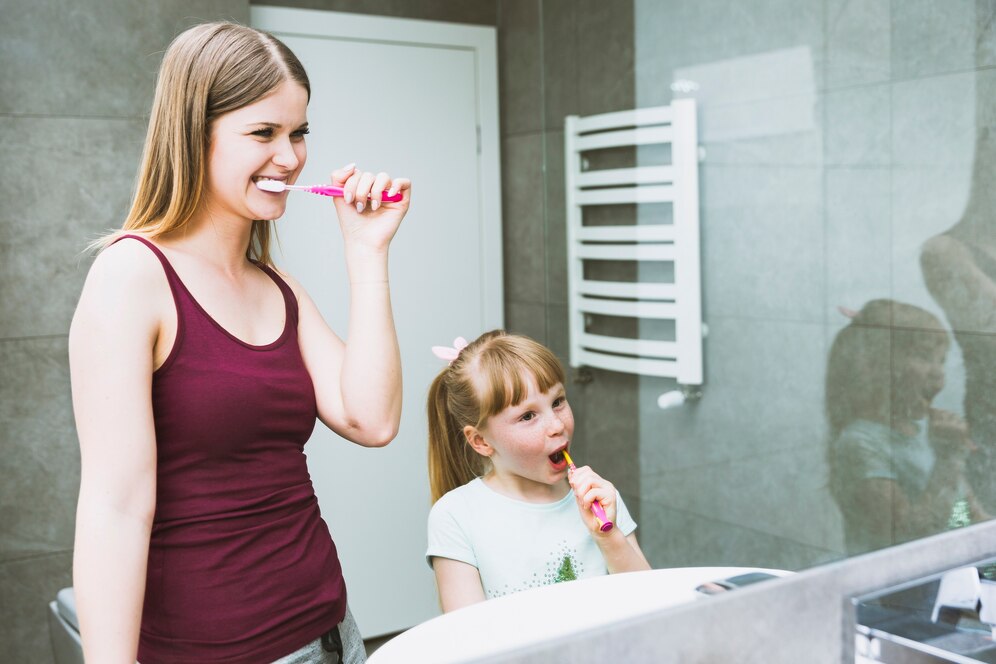Most people usually brush their teeth after breakfast, lunch, and dinner and before going to bed at night. Perhaps you have the same habit, but would you be surprised if someone told you that it is the best to brush your teeth before you have breakfast? Is it really best to brush your teeth before breakfast? Or should we brush our teeth immediately after eating a meal or after waiting for a while? You are confused, aren't you?
Let's look for the answers to these crucial questions together.

When should I brush my teeth?
To clarify whether you should brush your teeth before or after a meal, a better approach is to look at the effects of brushing before and after a meal.
Effects of brushing teeth before eating
- Brushing before eating removes plaque buildup and bacteria in the mouth. This reduces the acid production of these bacteria during meals and reduces the risk of tooth decay.
- If the meal includes acidic foods such as orange juice, lemon, yoghurt, etc., it is better to brush before eating to avoid the risk of erosion, which can damage tooth enamel.
- If you have sensitive teeth, brushing before a meal can increase fluoride protection.
Effects of brushing teeth after a meal
- Brushing after a meal removes food particles, bacteria, and dental plaque left on the teeth. This reduces the risk of cavities and gum disease.
- Brushing after a meal prevents bad breath odour after eating. It provides oral hygiene, especially after highly odorous foods such as onions and garlic.
- Sugary or starchy foods that accumulate in the mouth during meals are converted into acids by bacteria. Brushing prevents these acids from damaging tooth enamel.
Should you brush your teeth before or after breakfast?
It is better to answer this question by saying that brushing your teeth before breakfast can be more beneficial. Brushing your teeth when you wake up is better than brushing after breakfast, as it protects the enamel more. Of course, it is a good habit to brush your teeth after breakfast. But brushing before breakfast has additional benefits.
Why is it better to brush before breakfast?
- If you brush your teeth before breakfast, it helps to get rid of the bacteria that multiply in your mouth during the night and removes bad odour from your mouth. Also, the fluoride in toothpaste creates a protective barrier on the surface of your teeth.
- If you brush your teeth before breakfast, you start saliva production.
Can you brush your teeth after breakfast?
Of course you can brush your teeth after breakfast. It is a healthy habit to brush your teeth after breakfast. Thus, you can prevent food residues and plaque formation after breakfast and prevent bad breath after the flavored foods and drinks you consume at breakfast, such as tea, coffee, cheese, etc.
How long after breakfast should you brush your teeth?
It will be useful to wait 30-60 minutes after breakfast to brush your teeth.
How should oral care be after breakfast?
Oral care before and after breakfast is essential to maintain oral and dental health and start the day healthily. Effective oral care after breakfast prevents tooth decay, gum disease, and bad breath. If you have time, brush your teeth before breakfast and rinse or gargle afterward. Here are a few tips for oral health after breakfast.
- To help protect tooth enamel by neutralising the action of acids, rinse your mouth with water immediately after breakfast to remove food debris and the remains of acidic foods.
- To reduce the risk of tooth enamel erosion after acidic foods and drinks, wait at least 30 minutes and then brush your teeth.
- Brush your teeth gently using a soft toothbrush and fluoride toothpaste.
- You can also prevent bad breath by brushing your tongue.
- Use dental floss to clean between teeth where the brush cannot reach.
- You can complete oral care by using a mouthwash containing fluoride. This provides extra protection against bacteria and freshens your breath.
- If brushing your teeth immediately after breakfast is not possible, you can chew sugar-free gum. Sugar-free gum increases saliva production, neutralises acids, and protects teeth.
Morning tooth brushing tips for kids

There are several methods that parents should follow to ensure that children get into the habit of brushing their teeth in the morning and have a healthy mouth and teeth. It is very important for parents to make brushing teeth fun for children. Here is what parents should do:
- Make the toothbrushing process more attractive for children by choosing toothbrushes with a cartoon character your child likes or colourful toothbrushes and flavoured toothpastes.
- Teach that teeth should be brushed for at least 2 minutes.
- Guide your child to brush their teeth at first; brushing together can be both educational and fun.
- Teach your child the correct way to brush your teeth. You can model this by taking your child with you when you brush your teeth in the morning.
- Make a toothbrushing chart and reward your child for each brushing with a star or sticker.
- Adjust the amount of toothpaste your children use. For children under 2 years of age, a grain of rice-sized toothpaste is sufficient. For children over 2 years of age, pea-sized toothpaste should be used.
How to brush your teeth?
You can use a manual or electric toothbrush. However, choose a soft-bristled toothbrush, as a hard-bristled toothbrush can be too abrasive for your tooth enamel. Brush your teeth with fluoride toothpaste following the tips below.
- Brush your teeth by holding the toothbrush at a 45-degree angle to them.
- Use a gentle circular motion when brushing your teeth. Avoid hard and fast movements. Do not apply too much pressure while brushing. A light pressure is enough to clean the teeth and does not damage the gums.
- Make sure to clean the outer, inner, and chewing surfaces of the teeth. Brush along the gum line to prevent plaque buildup in this area.
- Brush your teeth for at least 2 minutes. Spend about 30 seconds on each mouth quadrant (upper right, upper left, lower right, lower left).
- Replace your toothbrush every 3-4 months or when the bristles wear out.
- Use dental floss to clean between teeth where the toothbrush cannot reach.
- After cleaning your teeth, brush your tongue with your toothbrush.
- Spit out excess toothpaste and do not swallow it.
- You can use antibacterial mouthwash to complete oral hygiene.
How long after a meal should I brush my teeth?
If you have consumed acidic drinks such as oranges, grapefruits, lemons, sodas, or soft drinks at meals, you should avoid brushing your teeth for at least an hour. Acid can erode the hard tissues on the tooth surface and weaken the enamel. Acid erosion can cause permanent damage to your teeth. Brushing your teeth immediately after eating can further damage weakened enamel.
F.A.Q:
Should I brush my teeth after every meal?
Brushing your teeth after every meal is not necessary, and brushing 2-3 times a day is sufficient to maintain oral health.
I can'not brush my teeth after eating. What should I do in this case?
However, you can support your oral hygiene by taking additional measures such as rinsing your mouth after eating or chewing sugar-free gum.
Do I need to brush my teeth immediately after each consumption of acidic drinks?
To neutralise the acid, do not brush your teeth immediately after consuming acidic drinks. Rinse your mouth with water and wait at least 30 minutes, and then brush your teeth.
Is drinking a glass of water before breakfast good for oral hygiene?
Drinking a glass of water before breakfast is a simple and effective habit to improve your oral hygiene. This not only helps to clean the bacteria in the mouth but also prevents dry mouth and bad breath.
Is it useful to brush your teeth before going to bed at night?
Brushing your teeth before going to bed at night is one of the most effective habits to prevent tooth decay and gum disease.

